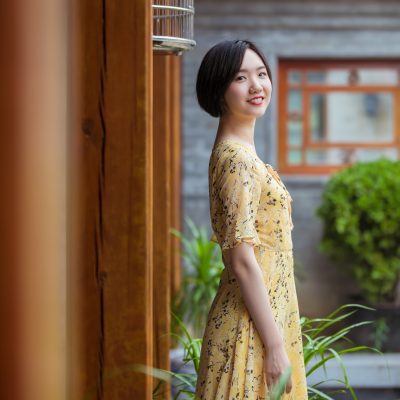Student Spotlight: Peiying Zhu

January 24, 2022
Peiying Zhu is a doctoral candidate in philosophy from Beijing, China. After attending Wellesley College as an undergraduate, she chose to pursue further study at Cornell due to the field of philosophy’s reputation and supportive community.
What is your area of research and why is it important?
My area of specialization is ancient philosophy. Specifically, my dissertation aims to provide an interpretation and critique of Plato’s theory of eros (translated as “desire” or “love”). Outside of ancient philosophy, I am also interested in the contemporary philosophy literature on love. Right now, I’m working on a project that marries these two interests. I believe Plato offers important insights on the value and benefits of erotic love that are rarely discussed. That is, the act of loving can be valuable for the lover even in the absence of an equal, reciprocal relationship which most contemporaries consider necessary for love to be rational or beneficial.
What are the larger implications of this research and how is it making an impact?
For decades moral philosophers have focused on the “caring” aspect of love. The thought is that to love someone is to care for them or wish for their flourishing for their own sake. This idea of non-instrumental concern can be traced back to Aristotle’s account of philia (translated as “friendship” or “love”). In comparison, Plato’s theory of eros (or philia) has had little sway on how contemporary philosophers think about love. With my work, I hope to show that Plato has a lot to contribute to how we should think about love, both its phenomenon and its impact on our lives.
How is participation in Careers Beyond Academia workshops and events expanding your ideas of what careers are available to humanities Ph.D.s?
Last winter I went to a small group session provided by Careers Beyond Academia. I remember one question that I was asked there was: what cause do you care about? Before then I had thought about job hunting as the process of being chosen (which in a large part it is), and I had been somewhat narrow-minded about the kind of work I could be qualified to do. But that question got me thinking about what I look for in a career and what kind of work matters to me. I realized that personal interests can play a part not just within research and academic work, and I can approach career planning from a more active point of view.
Which Careers Beyond Academia workshop(s) have you attended recently and what were your most important takeaways?
This semester I went to the workshops sponsored by the CNY Humanities Corridor with Christopher Caterine, the author of a guidebook for academics on how to change careers. Those few hours were eye-opening. The speaker showed us the biggest challenges that academics face when trying to connect with people who do not speak our lingo and how we could overcome those challenges. For instance, he demonstrated in a step-by-step manner how to network with strangers, which would be the first step to looking for a non-academic job. The workshops provided me with a clear picture of how to proceed if I ever decide to leave the profession, which allowed me to focus on my current projects without excessive anxiety about the future.
What are your hobbies or interests outside of your research or scholarship?
During the pandemic, I became a very passionate baker. I have always loved eating desserts and baked goods, but it wasn’t until I was stranded in Ithaca, with very limited access to good bakeries and a lot of alone time, that I began baking seriously. The artistry and precision involved are fascinating, and I love tweaking recipes to create my own flavor combinations. My favorite things to bake are biscotti (cantucci), pasteis de nana, choux pastry, and vegan layer cakes. This semester I’ve been practicing cake rolls as well. I find baking to be a great way to connect with people—who would say no to a slice of cake?
Why did you choose Cornell to pursue your degree?
I chose Cornell because it is a great fit for me, both in terms of academic interests and personality. Cornell has a very prestigious ancient philosophy program, and it has become a hub for moral psychology in recent years. The field of philosophy as a whole has a great sense of community, and the graduate program is designed to encourage intellectual exploration and personal growth. My whole committee, especially my advisor, has been incredibly supportive and nurturing since I started here. I cannot picture myself pursuing my Ph.D. anywhere else.
